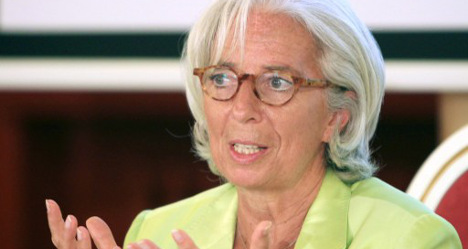Spain's economy, the fourth largest in the eurozone, has been shrinking for two years and official data show the unemployment rate hit 26.26 percent in the second quarter of this year, slightly below the record 27.16 percent posted in the first quarter.
The outlook for Spain's economy, the fourth largest in the eurozone, is "difficult and risks are high," the International Monetary Fund's annual report said, predicting a 1.6-percent economic contraction this year, zero growth in 2014 and growth of just 0.3 percent in 2015.
"The weak recovery will constrain employment gains, with unemployment remaining above 25 percent in 2018," said the report compiled by IMF staff.
The Washington-based institution said it expected the Spanish unemployment rate to hit 27.2 percent this year, then dip to 27.0 percent next year, 26.9 percent in 2015, 26.6 percent in 2016, 26.0 percent in 2017 and 25.3 percent in 2018.
In its previous World Economic Outlook report in April, the Fund had said it expected the jobless rate to dip below 25 percent two years earlier, declining to 24.7 percent in 2016.
IMF executive directors praised Madrid for economic reforms, including 2012 legislation making it cheaper to lay off workers and easier to change staff hours and cut wages.
"However the economy remains in recession, with unacceptably high unemployment, and the outlook remains difficult," the directors said.
"Labour market dynamics need to improve further in order to reduce unemployment sufficiently."
IMF staff who held talks with Spanish government officials said the labour market dynamics "do not seem to have improved sufficiently" despite last year's reforms.
"In the end, faster wage adjustment would likely lead to fewer people losing jobs or consuming less for fear of this risk and more unemployed being hired," the staff said.
The minimum wage in Spain is €645 ($850) a month.
Besides enabling wage cuts, the IMF officials urged Spain to narrow the gap between workers on permanent contracts, who have the right to high payments in case of dismissal, and those on more precarious temporary contracts.
If Spanish unions and employers could agree on the reforms, such a deal would accelerate job gains, the IMF staff report said.
But Spanish government officials "did not see the present social environment as sufficiently receptive for such an agreement and feared that trying to reach one might stall crucial reforms," it added.
The IMF mission chief for Spain, James Daniel, said in a separate report that the recession-hit Spanish economy would probably show growth later this year "in the fourth or even third quarter."
"But the really important question is not whether Spain will grow but whether Spain will grow enough to create lots of new jobs to bring down unacceptably high unemployment and to increase household incomes."
Spain has never managed to achieve net job creation with economic growth of less than 1.5–2.0 percent, the IMF report said.



 Please whitelist us to continue reading.
Please whitelist us to continue reading.
Member comments